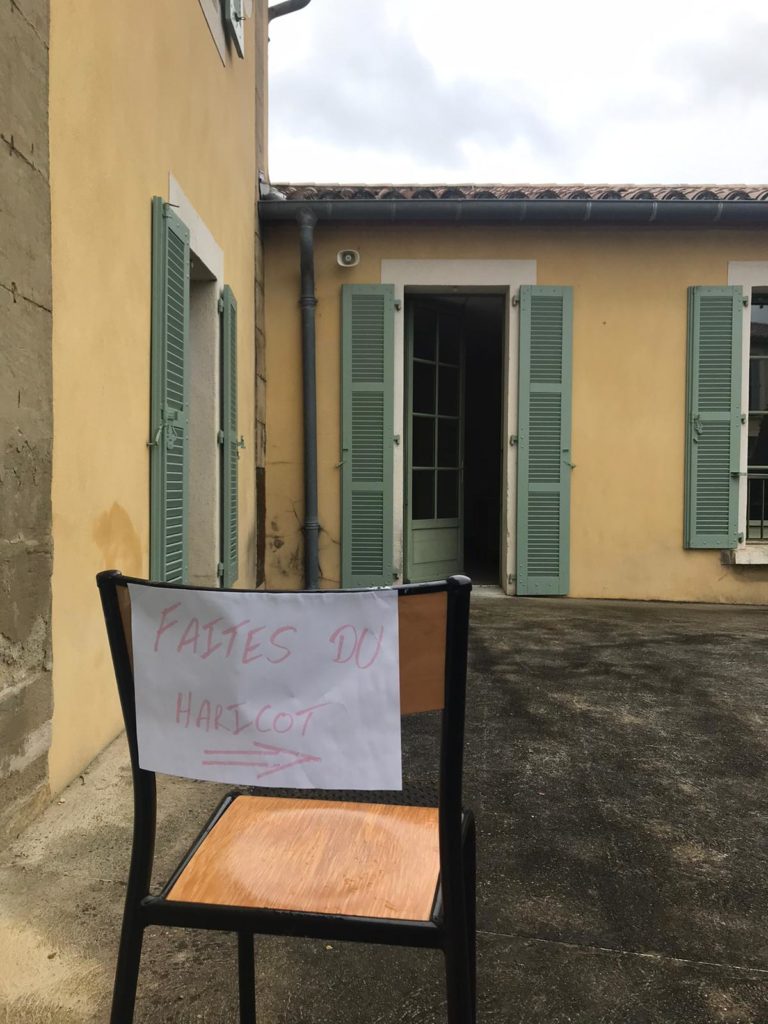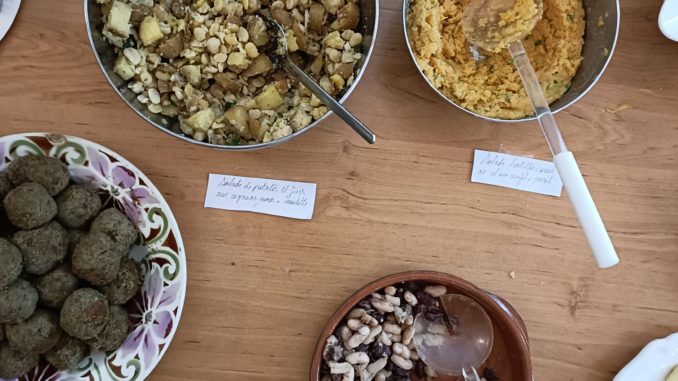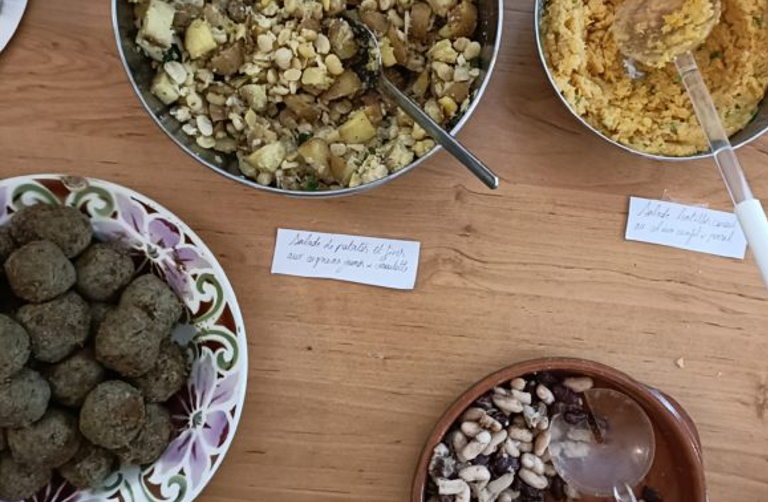This article first appeared on ARC2020.eu. ARC2020 is a platform for agri-food and rural actors working towards better food, farming, and rural policies for Europe.
If we all agree to take back the power over our food, what do we need?
On Saturday 22nd April, the Global Bean network, including ARC2020 and its projects Rural Resilience and Seeds4All, invited its members to organise in-person events to celebrate the diversity of pulses in Europe and beyond (Albania, Austria, Ethiopia, France, Germany, Greece, USA). These leguminous celebrations then connected online for the Global Bean Seed Festival to talk about their initiatives and showcase their varieties.
Helping to frame the discussion, Xavier Hamon, artisan cook, president of the Alliance of Free Tables (formerly Alliance des cuisinier.e.s, a partner of the Rural Resilience project) and director of the Université des Sciences et des Pratiques Gastronomiques (another partner of the project). His political statement encourages us to take the power back over our food, by re-cultivating of hundreds of varieties of grains and pulses, taking back land, winning political mandates, and most of all, support to those who work for the living world, day after day. Below is the full text of Xavier’s presentation.
Words by Xavier Hamon
Lire cette tribune politique en français
Dear Partners,
I was asked to present a political angle on the question of seeds and beans. I am very proud that a cook has been asked for political comments: it means that the view of our profession is starting to change, and the vision of the Alliance des Tables Libres et Vivantes is starting to be understood. We are no longer only tools for territorial promotion. I measure the road travelled and I thank the organisers for their trust.
Less the story of beans, more culture and politics
Before I begin, to be clear, the cooks that I represent are all fighting for better food, better use of pulses and cereals, more plant-based food, the end of industrial livestock, and support for sustainable extensive livestock farming.

“Faites du haricot!” An invitation to “Bean Up!” and join one of several in-person events organised to coincide with the Global Bean Seed Festival: in this case, a gathering hosted by Seeds4All and partners in Castelnaudary in the South of France. Photo: Adèle Violette
A cultural and political story first, then a bean story
Sorry to keep referring to the French example, but it is what I know best. Perhaps it can offer the biggest gap between completed transition projects and the horror of agribusiness and poor quality food.
In France, in the world of cuisine, in a country that calls itself the capital of gastronomy, only certain people are allowed to talk about the professions that feed us.
And so we all are subject to the dominant discourse. Cultural hegemony, as Antonio Gramsci described it. Behind this dominant discourse are vested interests.
- First, electoral interests. Politicians love to be seen with local ‘Chefs’ for public relations.
- Next, tourism. Tour companies sell the gastronomy dream to promote mass tourism that is no longer tenable.
- The French media loves this hegemonic discourse. Television, radio, newspapers and magazines are brimming with stories on good food in France, gastronomy, art de vivre and French culinary genius.
The cultural hegemony does not correspond to the reality. This vision of ‘chefs’ represents less than 1% of the food services sector in France. The rest is left to the agri-food industry and fast food, which brings low quality jobs and the loss of professions that work with the living world.
All this translates into a desertion of personnel from kitchens and restaurants because in addition, the reality of working conditions is so terrible that no-one wants to do these jobs. As they say: “Business as usual”.
And that’s the solution: Agribusiness is a perfect match for the Food Business, with the historical complicity of the great French chefs who were part of the development of the agri-food industry.
The parallel with agriculture is evident. There is also a hegemonic discourse that leaves little place for what all of you do, every day. Questions of farming and food are managed in the offices of the ministry of agriculture or at the general assembly of the biggest agricultural union in the country. Sensing that deep changes in society are questioning their ecocidal and socially unacceptable models, the agricultural hegemony deploys fiction, storytelling, greenwashing, corporate social responsibility, the media and politicians, to reassure consumers, so that they continue to be fed by the big food retailers.
Relationship with the living world
In both gastronomy and agriculture, we see the same losses:
- Loss of jobs to industrial operators
- The profession continuously adapts: know-how, the environment, climate, a global vision, relationship to humans and to the living world to maintain a social, economic and cultural balance that is sustainable
- An operator does not need to have a global vision. The work is only to execute tasks, to apply procedures, for the principle of economic profitability
- Loss of skills around food. This is a major challenge to putting beans back on our plates :
- selecting the beans,
- growing them,
- harvesting them,
- preserving them,
- transporting them,
- cooking them
- Loss of connection to the living world:
- The entire history of industrialisation of our food has been to cut us off: from the land, from skills, to automate and therefore cut us off from the living world, and so to distance people from the realities of food and farming
- Decision making: when the content of our plates is decided, we are not ‘at the table’
- Cultural loss: Standardisation has impoverished biodiversity, in the wild and in agriculture, and with it, all the histories of plants, seeds, beans that are tied to the particularity of a territory. Especially, all that makes up culture and that allows us to create society.
Bean growing has always mixed beliefs, pagan and religious, agronomic conditions, histories of migration, food needs, to constitute shared living cultures.
This shared culture allows for the kind of social intelligence embodied by community festivals.
Without this relationship to the living world, without these relationships to each other and a shared culture, there is no life in society. Beans also carry this cultural responsibility.
What we need
We have the knowledge. We know how to do the transition. But it’s still a long road to find the means to move from activism to a real development of the sector.
If we all agree to take back the power over our food, what do we need?
Ingredients:
- Much greater plant diversity, and a return to growing hundreds of varieties of cereals and pulses suited to different soils, and to different diets and tastes
- Cultural re-conquest of beans through taste, cultural exchanges, learning from each other, knowledge sharing
- Take back farmland and support new producers of pulses to start farming
- Create regional or local seed agencies, for adaptation to climate change and seed exchanges
- Train producers, seed savers, cooks
- Adapt the training curriculum (for agriculture and hospitality)
- Fight new GMOs, patents on life
- Pay the work in these sectors, re-orientate EU budgets
- Get away from a romantic vision: consider the lived experience of our fellow citizens
- Finance business engaged in the relationship with the living world
- Tax the most destructive farming and food production practices

Celebrating pulses in Castelnaudary. Photo: Adèle Violette
Wake up call
Let’s admit it: if we take our heads out of our nice stories, we don’t live in a world that is concerned with the common good. It’s a capitalist world that co-opts our arguments in a relationship that is closer to transhumanism than to the living world.
Our resistance in opposing this system shows an important trait of the human character. We still have a survival instinct, a trace of our reptile brain that invites us to resist. We inherit the history of past struggles and social victories.
History is repeating itself on the sides of the dominants: transhumanism echoes the futurist movement of the 1920s. On our side we also inherit past resistance movements to anchor us in the living world and to put humans back in a position of deciding for ourselves. The political movements after World War Two, and the social victories that followed until the 1980s, show that other ways are possible.
To quit the existing model, we need to have bigger ambitions, collectively. We need more of us. Alone, small-scale models will only save themselves – they will not save the common good, or the damage done to food.
Faced with resistance, the actors who have power in the institutions
Two recent events show us that there is still a long road ahead:
- In summer 2021, the Dutch government took measures to meet its European commitments to reduce pollution from intensive livestock farms. These measures resulted in a 30% reduction in the national herd. The reaction was immediate: productivist farmers protested massively all over the country. In March 2023, the counter-attack translated into votes and the new party, Farmer-Citizen Movement, won 15 seats. This new party is now the biggest in the Dutch senate and is beating traditional parties. The head of the party is a former spokeswoman for a productivist agricultural union.
- In April 2023, Le Monde published a 7-year investigation and more than 300 interviews on the agri-food model in Brittany (West of France).
We saw the same elements of cultural hegemonic discourse. As in the Netherlands, the power of productivist agricultural unions translates into the strong presence of these farmers in decision-making spaces: municipalities, regions, the boards of banks and insurance companies, chambers of agriculture and agricultural colleges.
Commitments and mandates
To develop better food, a better relationship with the living world, we can no longer leave the power to these influencers. The representative bodies of our republics can no longer be personified by only the capitalist and technological model.
Our discourse is not enough. Our advocacy is not enough. We have to find the means to campaign, to win mandates, to be where the decisions are made. None of us can do it alone. Which is why my final message is to invite you to build the means of our ambitions for fairer food systems:
- Be present in places of political decision-making. Campaign for election to professional and citizen mandates
- Financially support businesses that
- Work the land
- Select
- Produce
- Harvest
- Process
- Cook
- Serve……
……….. the number one element of our mental and physical health: food.
Let’s pay with dignity the people who work for the living world every day, and take back the power over our plates – by means of mandates, not our bank cards.
Thank you very much.
Watch Xavier Hamon’s presentation at the Global Bean Seed Festival here.





